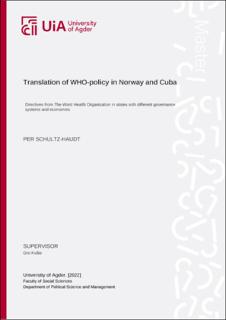| dc.description.abstract | Transnational governance is governance that takes place across national boundaries and
involving a diverse set of actors. One such actor is the World Health Organization which is
central to transnational collaboration and policy development globally. Recently the WHO
played an integral role in the worldwide battle against the Covid-19 pandemic and the
organization has been a central figure in global public health through its declarations and
directives that effectively constitute transnational policies. Perhaps the most prevalent of these
are the Ottawa Charter and the Health in All Policies that emerged after it.
Norway and Cuba are two public health puzzles that despite their large differences in
governance structures and economies both have good results in population health. Both are
members of the WHO, but how have the two countries translated transnational policy in the
form of WHO-policy into public health measures and policies?
This thesis seeks to answer this question with the help of translation theory as a theoretical
framework to interpret how WHO-policy is translated into the Norwegian and Cuban contexts,
using a multi-case design. A literature review was conducted to acquire and systematize data
that was analyzed through a content analysis of both cases. The aim of this study was to
contribute to the literature about the implications and significance of transnational policy on
the national levels.
Some central findings are that national Norwegian public health policies that were found to be
largely reproduced from WHO-policy elements. However, there is a level of conflict between
the overarching policies of the national level and the municipal actors who work with
implementing them.
Additionally, Cuban public health work was found to largely be based around community
involvement and situationally contingent public health measures that appear to be modified
translations of WHO-policy.
The main finding of this thesis as it pertains to transnational governance is that national
translations of transnational policy are likely to be reproduced to a much larger degree than
regional and local translations that are more likely to be modified by the recipient contexts. | |
